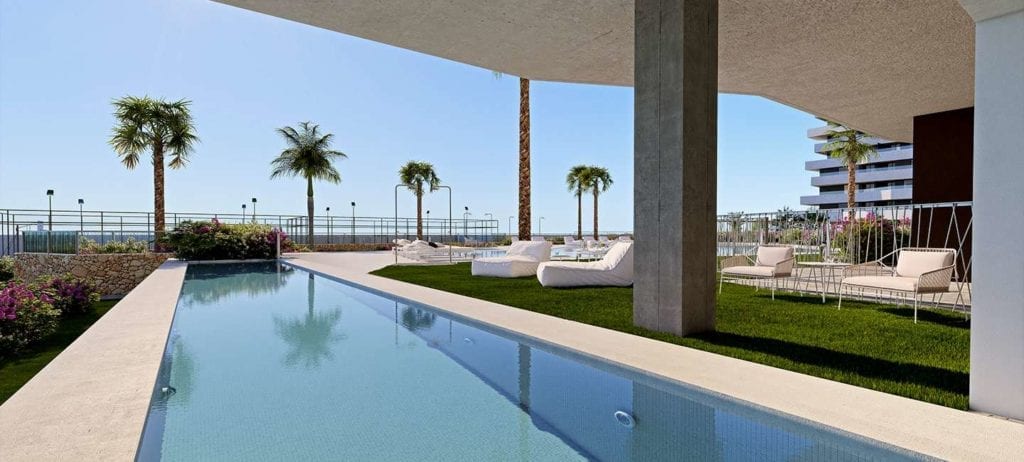2 February 2018 – Expansión
Market / The property developers Amenabar, Aelca and Corp take the lead in the race to notarise new homes.
The property developers have returned to the forefront after years of ostracism. In this way, two companies, Neinor and Aedas, debuted on the stock market in 2017, putting an end to the 10-year drought. Meanwhile, a historical company in the sector, Metrovacesa, is planning its stock market debut for Monday (5 February), and is waiting to close the requests book.
These companies, together with the other large property developers such as Vía Célere, Aelca and Habitat (all three of which are controlled by investment funds) have set themselves the objective of handing over between 3,000 and 4,000 homes per year, something that they will achieve over the next 2-4 years. Nevertheless, for the year just ended (2017), the figures recorded were much more modest.
According to data facilitated by the companies, the 13 largest residential property developers notarised an average of 270 new homes each last year. Together, they handed over just 3,168 units, compared with the more than 77,500 newly-built homes that were sold (according to data as at November from INE).
Amenabar is the leader of the ranking for the number of homes handed over. The property developer owned by the Amenabar family closed 2017 with 752 homes notarised. This year, that company, which is headquartered in Zarautz plans to start work on around 3,094 homes and to sell 4,087 units.
Of those properties for sale, approximately half correspond to land in the portfolio and the rest to new purchases to be made over the coming months, say sources at the company.
With almost 500 units each, Aelca and Corp Promotor complete the top three firms in terms of the number of homes notarised, with 498 and 496, respectively. Founded in 2012 by José Juan Martín and Javier Gómez, and controlled by Värde Partners (75% stake), Aelca is one of the new real estate companies and it has a more advanced pace of work. In this way, it plans to launch almost 4,000 homes across almost 50 new developments during 2018. In 2017, Aelca sold 1,128 homes.
Meanwhile, with 360 flats registered, Gestilar also stands out. The Madrilenian company created by Javier García-Valcárcel closed sale and purchase or pre-reservation contracts for another 419 homes in 2017, up by 57% compared to 2016. The company controlled by its founder does not have any immediate plans to debut on the stock market. Nevertheless, it has closed an alliance with one of Morgan Stanley’s investment funds to boost its plans to buy land and subsequently develop it.
Neinor
With a figure of more than 300 units (between 310 and 315, according to the latest estimates from the company), Neinor Homes has accelerated its house building plans to fulfil its business plan, which aims to put between 3,500 and 4,000 homes per year on the market between now and 2020.
Those hand overs will allow Neinor to increase its revenues, which, during the first half of last year, amounted to €127 million, after the hand over of 150 units.
It was followed by Inbisa, with 223 notarisations, and Vía Célere, with 183. The real estate firm led by Juan Antonio Gómez Pintado handed over two developments in Madrid and part of a third on c/Aragó in Barcelona, its first project in the Catalan capital.
In the absence of year-end data, during the first three quarters of last year, Realia handed over 80 homes amounting to €16.9 million (around €212,000 per unit), compared with 69 and €13.4 million in the previous year.
Less than ten each
Finally, three of the largest domestic property developers are operating at a much slower rate. Such is the case of Quabit, which notarised just six homes in 2017, although it is expected to reverse that situation this year, after closing new land purchases, including co-investment alliances with the fund Avenue Capital. In this way, it plans to hand over 215 units in 2018, corresponding to four developments in Boadilla, Barcelona and Guadalajara, and also start work on around 2,000 new homes, confirms the company.
In the case of Habitat, the company did not notarise any homes in 2017, a year that was marked by its own sale, formalised by Bain Capital Credit just a few weeks ago. Now, the fund is working to boost the company, which is planning to hand over its first homes in 2018, of the more than 1,000 that it has up for sale.
The same thing is happening with Aedas. Launched in 2016, the company controlled by the fund Castlelake plans to hand over its first 231 homes this year.
Original story: Expansión (by Rocío Ruiz)
Translation: Carmel Drake

 Portugal
Portugal  Italy
Italy  Greece
Greece 


